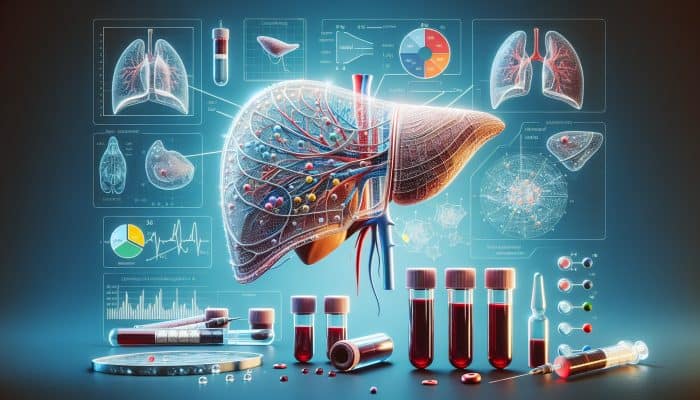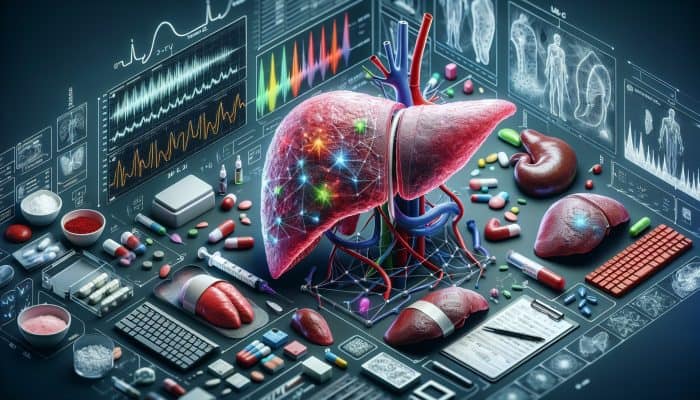In-Depth Guide to Advanced Liver Blood Testing Procedures
Exploring the Importance of Advanced Liver Blood Tests for Optimal Health

The Advanced Liver Blood Test in Walton-on-Thames serves as a crucial diagnostic tool utilised by healthcare professionals to meticulously evaluate liver function and overall health status. These assessments are pivotal for identifying various liver conditions at their earliest stages, which is essential for implementing effective treatment plans. An advanced liver blood test panel generally encompasses a wide array of specific tests that yield comprehensive insights into liver health, including:
- Alanine aminotransferase (ALT) – a fundamental marker that indicates liver inflammation.
- Aspartate aminotransferase (AST) – vital for determining the extent of liver damage.
- Alkaline phosphatase (ALP) – may suggest potential complications involving the bile ducts.
- Bilirubin – assesses the liver's capability to process waste efficiently.
- Albumin – evaluates the overall liver function and its capacity to synthesise essential proteins.
- Prothrombin time (PT) – measures the blood's clotting ability, directly linked to liver function.
- Gamma-glutamyl transferase (GGT) – indicates potential bile duct issues or habits related to alcohol consumption.
- Hepatitis serology tests – screen for viral hepatitis infections that can affect liver health.
Why Regular Liver Testing is Key to Sustaining Health
Regular liver testing is vital for sustaining optimal liver health and for the early detection of potential health issues before they escalate into serious conditions. Continuous monitoring offers numerous benefits, such as:
- Prompt detection of liver diseases, significantly enhancing treatment outcomes.
- Monitoring chronic conditions in individuals with a prior diagnosis of liver diseases, allowing for ongoing assessments of disease progression.
- Guiding lifestyle modifications that can boost liver health, including dietary changes and increased physical activity.
- Evaluating treatment effectiveness to ensure that interventions yield the desired results.
By participating in regular testing, individuals can confirm that their liver is functioning optimally, facilitating timely interventions that can avert severe health complications and enhance their overall quality of life.
Key Preparation Tips for Your Liver Blood Test
Effective preparation for a liver blood test is essential for securing accurate and reliable results. Patients are usually advised to follow specific guidelines prior to the test, which may include:
- Fasting for at least 8 hours before the test to eliminate food-related influences that could distort results.
- Avoiding alcohol for at least 24 to 48 hours before testing to prevent interference with liver enzyme levels.
- Consulting with a healthcare provider about medications, as some may need to be temporarily paused before testing.
- Staying well-hydrated by drinking plenty of water, which can make the blood draw process smoother during testing.
Adhering to these preparation guidelines can significantly improve the accuracy of test outcomes, offering clearer insights into liver health and functionality.
Expert Perspectives on Advanced Liver Blood Testing in Walton-on-Thames

How Do Healthcare Professionals Evaluate and Interpret Liver Blood Test Results?
Healthcare professionals meticulously evaluate liver blood test results by examining specific markers and indicators that provide insights into liver functionality. For instance, elevated ALT levels may signify liver inflammation or damage, whereas increased bilirubin levels can indicate liver dysfunction or obstructions in bile flow. A typical scenario might involve a patient presenting with elevated liver enzymes, prompting further assessment for conditions such as fatty liver disease or hepatitis.
Providers integrate these results with the patient’s medical history and presenting symptoms to formulate a comprehensive understanding of liver health. For example, if a patient shows elevated GGT levels in conjunction with a documented history of alcohol consumption, the physician could recommend significant lifestyle adjustments or additional evaluations for potential liver disease.
What Are the Latest Innovations in Liver Testing Technology?
Recent advancements in liver testing have markedly improved the ability to detect liver diseases at early stages. New non-invasive testing alternatives have surfaced, offering options that are more comfortable than traditional liver biopsies. Innovations such as elastography techniques and advanced biomarkers specifically targeting conditions like non-alcoholic fatty liver disease have gained popularity.
To remain updated on these advancements, both healthcare providers and patients can participate in ongoing education through workshops, online seminars, and professional journals centred on hepatology. Maintaining an open dialogue with healthcare practitioners can promote awareness of new testing methodologies, ensuring that patients benefit from the highest standards of care and the most current information regarding their liver health.
How Do Liver Test Results Influence Treatment Plans?

Liver test results play a pivotal role in shaping personalised treatment plans for patients. For example, if results indicate significant liver dysfunction, a healthcare provider may recommend more aggressive lifestyle modifications, including dietary changes and possible medication use. Conversely, if only mild irregularities are detected, close monitoring may suffice, depending on the patient's commitment to a structured follow-up schedule.
Furthermore, these results are critical for assessing the effectiveness of ongoing treatments. For example, if a patient receiving therapy for hepatitis shows positive trends in liver enzyme levels, it could indicate that the current treatment is effective and should be continued. In contrast, a lack of improvement may require a reassessment of the treatment strategy to better accommodate the patient's needs.
Where Can You Access Advanced Liver Testing Services in Walton-on-Thames?
Residents of Walton-on-Thames can conveniently locate several reputable clinics and healthcare facilities that provide advanced liver testing services. Noteworthy locations include:
- Walton Health Centre – renowned for its extensive diagnostic services, including liver testing.
- St Peter’s Hospital – offers specialised liver testing along with expert consultations.
- Local GP surgeries – many are equipped to perform initial liver blood tests as part of routine health evaluations.
- Private clinics – provide expedited testing and results for those seeking prompt assessments without long waiting times.
By selecting a facility that aligns with their individual needs, patients can ensure they receive thorough and professional care regarding their liver health concerns.
What is the Recommended Frequency for Liver Blood Tests to Maintain Optimal Health?
Experts generally recommend that individuals, particularly those at heightened risk for liver disease—such as those with diabetes, obesity, or a family history of liver issues—should undergo liver blood tests every 6 to 12 months. For individuals already diagnosed with liver disease, more frequent testing may be essential to closely monitor disease progression and treatment efficacy.
Regular testing facilitates early intervention in the event of potential issues, making it a cornerstone of preventive healthcare. Consistent evaluations can lead to timely lifestyle adjustments or therapeutic measures that significantly impact a patient’s liver health and overall well-being.
Finding Advanced Liver Blood Testing Facilities in Walton-on-Thames
Local Clinics Offering Comprehensive Liver Blood Testing Services
Walton-on-Thames is home to several clinics providing advanced liver blood tests, ensuring residents have convenient access to essential diagnostic services. Key clinics include:
- The Walton Clinic – provides a wide array of comprehensive blood testing services.
- Thames Ditton Health Centre – offers easy access to liver health testing.
- Elmbridge Medical Practice – recognised for its patient-centred care approach and high-quality services.
- Private laboratories, such as Healthcare at Home, facilitate home testing options for added convenience.
These facilities not only conduct testing but also frequently provide extensive follow-up care, ensuring patients receive the necessary guidance and support regarding their liver health.
What Can You Expect During Your Liver Blood Test Appointment?
During a liver blood test appointment, patients can anticipate a straightforward and efficient process. Initially, a healthcare professional will thoroughly explain the procedure, ensuring that the patient feels at ease and fully informed. Typically, the process begins with a brief consultation, where the patient’s health history is reviewed, followed by a swift blood draw.
The blood sample is collected, usually from a vein in the arm, using standard laboratory techniques to ensure safety and accuracy. After the blood draw, some clinics may provide immediate feedback on preliminary results or schedule a follow-up appointment to discuss comprehensive results. This streamlined procedure allows patients to quickly return to their daily activities while awaiting results, which generally arrive within a week.
What Criteria Should You Consider When Selecting the Right Clinic for Liver Testing?
Choosing the appropriate clinic for liver blood tests requires careful consideration of several essential factors. Important criteria to evaluate include the clinic’s reputation, the qualifications of its healthcare providers, and the range of services offered. Patients should also assess the costs associated with testing, particularly concerning insurance coverage, in their decision-making process.
Another key consideration is the availability of follow-up care. Clinics that provide ongoing monitoring and support for liver health are often more desirable, as they can deliver comprehensive care throughout the patient's healthcare journey. Seeking recommendations from healthcare professionals or patient forums can also assist individuals in locating reputable facilities in Walton-on-Thames that cater to their specific needs.
Gaining a Comprehensive Understanding of Liver Health and Common Diseases
Identifying Common Liver Conditions Through Blood Testing
Advanced liver blood tests are instrumental in detecting a range of frequent liver conditions, including hepatitis, cirrhosis, and fatty liver disease. Symptoms associated with these conditions can vary widely; for instance, hepatitis typically presents with fatigue, jaundice, or abdominal discomfort, while cirrhosis may manifest through symptoms such as swelling in the legs and abdomen or persistent itching.
Fatty liver disease, often associated with obesity and diabetes, may not exhibit noticeable symptoms initially. Regular testing can reveal elevated liver enzymes that indicate the onset of these conditions before they become symptomatic, facilitating timely intervention and effective management strategies.
Understanding the Liver's Critical Role in Bodily Functions
The liver is a vital organ, integral to numerous bodily functions, including detoxification, protein synthesis, and the production of essential biochemicals necessary for digestion. It plays a crucial role in metabolising nutrients and medications, making it indispensable for maintaining overall health and well-being.
The functionality of the liver can be adversely affected by lifestyle choices, such as excessive alcohol consumption, poor dietary habits, and a sedentary lifestyle. These factors can lead to conditions such as fatty liver disease and cirrhosis, underscoring the importance of making informed health decisions to enhance liver function and promote long-term health.
Key Lifestyle Factors That Influence Liver Health
Various lifestyle factors can significantly impact liver health and functionality. A diet high in saturated fats and sugars can contribute to the development of fatty liver disease, while excessive alcohol consumption can lead to inflammation and damage. Regular physical activity is essential for maintaining a healthy weight, which directly correlates with liver health.
Embracing lifestyle changes, such as adopting a balanced diet rich in fruits, vegetables, and whole grains, along with regular exercise, can greatly improve liver function. Furthermore, ensuring adequate hydration and minimising alcohol intake are crucial steps towards enhancing liver health and preventing disease progression.
Essential Preventive Strategies to Avoid Liver Disease
Preventing liver disease necessitates a proactive approach that includes regular medical check-ups, vaccinations for hepatitis, and the maintenance of a healthy lifestyle. Routine liver blood tests play a fundamental role in early detection, enabling timely interventions when necessary.
Additional preventive strategies encompass avoiding high-risk behaviours, such as unprotected sex and sharing needles, which can transmit viral hepatitis, as well as practising safe food handling to avert infections. Educating oneself about liver health empowers individuals to take control of their well-being by adopting habits that promote long-term liver health and disease prevention.
Evidence-Based Benefits of Advanced Liver Blood Testing in Walton-on-Thames
Improving Health Outcomes Through Early Detection of Liver Conditions
Early detection through advanced liver blood tests can significantly enhance treatment outcomes for liver-related conditions. Research indicates that identifying liver disease in its early stages often leads to more successful interventions and improved overall health management. For instance, when fatty liver disease is diagnosed early, patients can implement lifestyle changes that may prevent progression to severe liver damage.
Moreover, studies demonstrate that timely diagnosis of hepatitis infections can enable prompt treatment, substantially reducing the risk of complications such as cirrhosis or liver cancer. These findings emphasise the importance of regular monitoring of liver health, particularly for at-risk populations, to ensure timely and effective care.
The Long-Term Advantages of Consistent Liver Health Monitoring
Consistent monitoring of liver health through regular testing is crucial for preventing the progression of liver diseases. Patients who consistently track their liver function are more likely to adhere to recommended lifestyle modifications and treatments, which can significantly diminish the risk of serious health concerns.
Furthermore, ongoing assessments allow healthcare providers to adjust treatment plans as needed, ensuring that patients receive the most effective interventions as their conditions evolve. This proactive approach fosters a collaborative relationship between patients and providers, ultimately resulting in improved health outcomes and an enhanced quality of life.
Comparing Advanced Tests to Standard Liver Tests in Terms of Effectiveness
Advanced liver blood tests offer a more nuanced understanding of liver function compared to standard tests. While standard tests can indicate the presence of liver dysfunction, advanced tests provide more detailed insights, allowing for more accurate diagnoses of conditions like non-alcoholic fatty liver disease or autoimmune liver disorders.
Real-world examples illustrate that patients undergoing advanced testing frequently receive earlier diagnoses, enabling timely and potentially life-saving treatment decisions. These tests are particularly crucial for individuals with complex medical histories or those who do not respond adequately to standard treatment protocols.
Understanding the Costs and Accessibility of Liver Blood Tests in Walton-on-Thames
Typical Costs Associated with Advanced Liver Blood Tests
The cost of advanced liver blood tests in Walton-on-Thames can vary significantly based on the clinic and the specific tests performed. Patients can generally expect to pay between £50 and £200, influenced by whether the tests are conducted privately or through the NHS. Factors affecting the cost include the complexity of the tests, the pricing structure of the facility, and the necessity for follow-up consultations.
Many clinics provide packages that can help mitigate costs, especially for comprehensive testing panels. Additionally, patients should explore insurance options or NHS coverage to alleviate any financial burdens associated with testing, ensuring they prioritise their liver health without incurring excessive expenses.
Are Liver Blood Tests Covered by the NHS?
Yes, liver blood tests are typically covered by the NHS for patients who meet specific eligibility criteria. Individuals exhibiting symptoms indicative of liver disease or those at higher risk due to existing health conditions, such as diabetes or a history of alcohol use, are often entitled to undergo these tests at no direct charge.
Patients can access these essential services through their GP, who can facilitate necessary referrals. The NHS is dedicated to ensuring that vital health services, including liver health monitoring, remain accessible to all residents, promoting early detection and effective management of liver conditions.
How to Access Liver Blood Testing Services: A Step-by-Step Approach
Accessing liver blood testing services in Walton-on-Thames can be accomplished through local clinics or by obtaining an NHS referral. Patients should begin by reaching out to their GP, who can assess their need for testing and provide the necessary referrals. Many clinics also offer self-referral options, enabling patients to schedule appointments directly without needing a GP visit.
Once a referral is obtained or an appointment is arranged, patients can prepare for their blood test by adhering to the pre-test instructions provided by their healthcare practitioner. This ensures individuals receive comprehensive care tailored to their specific liver health needs and circumstances.
Locations of Liver Blood Testing Facilities in Walton-on-Thames
Residents can find liver blood testing facilities conveniently located throughout Walton-on-Thames. Key locations include:
- Walton Health Centre – centrally situated with a diverse array of testing services.
- St. Peter’s Hospital – a prominent facility offering advanced diagnostic services for liver health.
- Local pharmacies – some have begun offering basic blood testing services for added convenience.
- Private clinics – providing expedited testing options in the area for those seeking prompt evaluations.
This accessibility ensures that residents can easily obtain the necessary testing and follow-up care, contributing to improved liver health outcomes and overall well-being.
Typical Timeframe for Receiving Liver Blood Test Results
The timeframe required to receive liver blood test results in Walton-on-Thames can vary, typically ranging from a few days to a week. Several factors may influence this duration, including the specific tests performed and the processing capabilities of the testing facility.
Some clinics may offer expedited services, allowing patients to receive results more quickly, especially when urgent care is necessary. Patients should be informed about the expected timeframe during their appointment, enabling them to plan accordingly for follow-up discussions with their healthcare providers regarding their results.
Post-Testing Follow-Up Care and Treatment Approaches
What Are the Next Steps After a Liver Blood Test?
After undergoing a liver blood test, patients typically receive their results within a specified timeframe, often accompanied by a follow-up appointment to discuss findings and any necessary actions. During this follow-up visit, healthcare providers will review the results, explain their implications, and address any questions the patient may have.
Depending on the test outcomes, the provider may recommend further testing, lifestyle changes, or specific treatments tailored to the patient’s unique health profile. This ongoing dialogue is crucial for ensuring that patients understand their liver health status and remain actively involved in their care process.
What Treatment Options Are Available for Liver Conditions?
Treatment strategies for liver conditions can vary considerably, ranging from lifestyle modifications and medications to more invasive interventions such as liver transplantation. For individuals with mild liver abnormalities, lifestyle changes, including dietary adjustments and increased physical activity, may suffice to manage their condition effectively.
In cases of more severe liver damage or disease, medications may be required to address underlying issues, such as antiviral treatments for hepatitis. For patients facing life-threatening liver failure, a liver transplant might ultimately be the best option for restoring health. Understanding the appropriate treatment pathway is essential for effective management and recovery, ensuring patients receive the care they need.
How to Maintain Liver Health After Diagnosis?
Maintaining liver health post-diagnosis requires a commitment to adhering to medical advice and implementing lifestyle changes that support liver function. Key strategies include following prescribed medications, attending regular follow-up appointments, and making dietary alterations aimed at enhancing liver health.
Patients should also engage in regular physical activity, limit alcohol consumption, and avoid substances known to harm the liver. Staying informed about liver health and advocating for oneself in healthcare settings can empower patients to make decisions that positively influence their long-term health outcomes and improve their quality of life.
Frequently Asked Questions About Liver Blood Testing
What is an advanced liver blood test?
An advanced liver blood test evaluates liver function by measuring various enzymes and substances in the blood, assisting healthcare providers in the early identification of liver diseases.
How often should I have a liver blood test?
It is generally recommended that individuals at risk for liver disease undergo testing every 6 to 12 months, with more frequent evaluations for those with pre-existing liver conditions.
What symptoms might indicate liver disease?
Symptoms of liver disease can include fatigue, jaundice, abdominal discomfort, leg swelling, and persistent itching, varying in severity depending on the specific condition.
Is it alright to consume alcohol before a liver blood test?
No, it is advisable to abstain from alcohol for at least 24 to 48 hours before a liver blood test to ensure accurate and reliable results.
Are liver blood tests covered by the NHS?
Yes, liver blood tests are typically covered by the NHS for eligible patients, particularly those exhibiting symptoms or at high risk for liver conditions.
What can liver blood test results indicate?
Results may reveal liver inflammation, damage, or disease, guiding healthcare providers in making informed decisions regarding diagnosis and treatment planning.
Can lifestyle changes have a significant impact on liver health?
Absolutely, adopting a nutritious diet, participating in regular exercise, and minimising alcohol consumption can greatly enhance liver health and overall function.
What should I do if my liver test results are abnormal?
Consult your healthcare provider to discuss the results, identify the underlying cause, and develop a personalised treatment plan tailored to your specific needs.
What is the usual timeframe for receiving liver blood test results?
Typically, liver blood test results are available within a few days to a week, depending on the facility and tests conducted.
Where can I obtain a liver blood test in Walton-on-Thames?
Liver blood tests can be accessed at local clinics, hospitals, and private laboratories located throughout Walton-on-Thames, providing various options for residents.
Connect with us on Facebook!
This Article Was First Found On https://bloodtest.co.uk
The Article Advanced Liver Blood Test: Your Comprehensive Guide in Walton-on-Thames Was Found On https://limitsofstrategy.com
The Article Liver Blood Test: A Complete Guide for Walton-on-Thames Residents found first on https://electroquench.com

